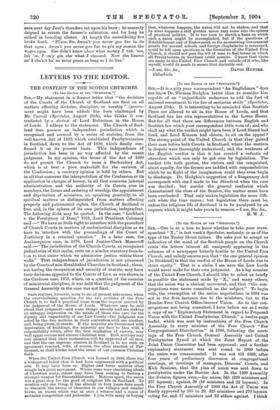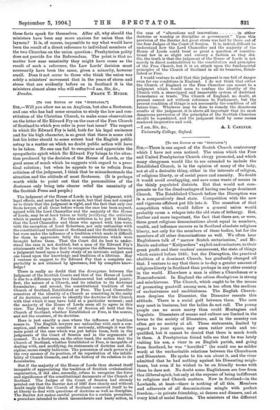[To THE EDITOR OF THE "SPECTATOR."] SIE,—One is at a
loss to know whether to take your corre- spondent "X.," in last week's Spectator, seriously, or as of the type of the Tooley Street tailors. He asks you to accept as indicative of the mind of the Scottish people on the Church crisis the letters (almost all unsigned) appearing in the columns of a newspaper bitterly hostile to the United Free Church, and calmly assures you that "the one general opinion [in Scotland] is that the verdict of the House of Lords was in strict equity." That is a claim I am sure the Law Lords would never make for their own judgment. As a lay member of the United Free Church, I should like to rebut as briefly as possible the statement made by "X.," and many others, that the union was a clerical movement, and that "the con- gregations were never consulted on the subject." To begin with, the resumption of the union negotiations in 1894 was not in the first instance due to the ministers, but to the Dundee Free Church Office-bearers' Union. As to the con- gregations not being consulted, I have before me as I write a copy of an "Explanatory Statement in regard to Proposed Union with the United Presbyterian Church," a twelve-page leaflet, which was sent by instructions of the Free Church Assembly to every minister of the Free Church "For Congregational Distribution" in 1898, following the meet- ings of the Free Church General Assembly and United Presbyterian Synod at which the Joint Report of the Joint Union Committee had been approved ; and a further explanatory statement was sent round in 1900 before the union was consummated. It was not till 1899, after four years of preliminary discussion at congregational meetings, at meetings of managers, Deacons' Courts, and Kirk Sessions, that the plan of union was sent down to presbyteries under the Barrier Act. In the 1899 Assembly the division figures were,—for union, 565 (328 ministers and 237 laymen) ; against, 38 (16 ministers and 22 laymen). In the Free Church Assembly of 1900 the Act of Union was finally approved by 593 to 29, 323 ministers and 270 laymen voting for, and 17 ministers and 12 elders against. I think
September 8, 1904.] T H E
these facts speak for themselves. After all, why should the ministers have been any more anxious for union than the laymen F It is, of course, impossible to say what would have been the result of a direct reference to individual members of the two Churches on the union question ; Presbyterian polity does not provide for the Referendum. The point is that no matter how near unanimity they might have come as the result of such a reference, the Law Lords' decision must necessarily have been the same, given a minority, however small. Does it not occur to those who think the union was solely a ministers' movement that in the years of storm and stress that are evidently before us in Scotland it is the ministers almost alone who will suffer F—I am, Sir, &c.,







































 Previous page
Previous page